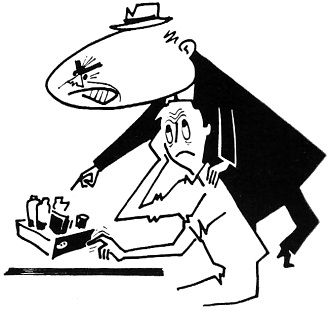|
July 1952 Radio-Electronics
 [Table of Contents] [Table of Contents]
Wax nostalgic about and learn from the history of early electronics.
See articles from Radio-Electronics,
published 1930-1988. All copyrights hereby acknowledged.
|
While reading through
these vintage electronics magazines, I often wish I could have lived in the era
and owned an electronics repair shop. Radios, televisions, record players, tape
recorders, amplifiers, etc., were very serviceable with plug-in vacuum tube
active components and point-to-point wiring with all leaded passive components
(capacitors, resistors, inductors, lamps, etc.). I know this from first-hand
experience working on a 1960's air traffic control radar system while serving in
the U.S. Air Force. As with today, servicemen often get a bad rap undeservedly
because of the low morals of some fellow practitioners. While it is
unfortunately true that bad eggs exist in the service world, a lot of customers
are rotten and try to take advantage of or outright rip off the technician. This
story from a 1952 issue of Radio-Electronics magazine is a tongue-in-cheek
parody from the viewpoint of a self-righteous customer looking to get his radio
repaired.
The Pest
 By B. W. Welz By B. W. Welz
All radio repairmen, jewelers, auto mechanics, and the like are crooks. Everybody
knows they take the parts out of what you bring in for repairs and put in old stuff;
that they're out to get all they can from you and don't care what cheap tricks they
use to do it.
That's why I insisted on watching the repairs on my 5-tube table model set when
I brought it to the service shop. I kept a careful eye on the repairman while he
made some tests and when he picked up a pair of snippers and started to cut something
out of my radio, I let him know I was watching.
"What are you doing?" I asked. "Move over a little," he said, and prodded me
with his elbow. I suppose I was crowding him. I moved, but kept my eyes on my radio.
"The trouble is an open resistor," he said, holding up a small, colorful object.
He looked through some boxes and found another jigger that looked something like
it, and soldered it into my radio. When he turned the set on it worked all right.
Then right away he tried to sell me something else.
"The speaker's warped," he said. "You'll need a new one."
"It sounds all right if I keep the volume down," I said, feeling firmly that
I wouldn't buy anything I didn't want.
"If I put in a new speaker now," he said, "it will cost you less because the
time will be charged to the same hour with putting in the resistor."
"The speaker's good enough for me," I said with finality.
He was still probing around inside the set, and suddenly he found something else.
"Oh, oh," he said, "the isolating condenser is shorted."
This man was deliberately trying to raise my bill. "The set sounds perfectly
all right," I said.
 "The isolating condenser," he explained, "isolates
the 110-volt line from the chassis. If it's shorted you might get a bad shock or
even electrocute yourself." "The isolating condenser," he explained, "isolates
the 110-volt line from the chassis. If it's shorted you might get a bad shock or
even electrocute yourself."
There seemed to be no stopping this fellow. He'd go to any lengths to make a
sale, even to the extent of frightening people. I said coldly, trying to make myself
perfectly clear, "Since my set works nicely as it is, I hardly think it necessary
to buy anything else for it."
"Where do you keep this radio?" he asked.
I always kept it on a window shelf over a radiator. "I don't see why that should
be important," I replied.
"Well," he told me, "this radio's got fancy metal designs on the front of the
cabinet that touch the chassis. If you get between them and a grounded object you
could get a fatal shock."
"I don't intend to buy a new condenser," I repeated, solid in my stand against
having anything I didn't want forced on me. "The radio is O.K. as it is."
He sighed, I think he was getting the idea I wasn't a yokel he could hoodwink.
When he turned the set over it made a little static noise I had been noticing lately.
He picked up a pencil and tapped the tubes with the eraser.
"Be careful," I warned.
Suddenly the radio went dead as he tapped one of the tubes.
Naturally that made me sore. "Now what did you do?" I demanded heatedly.
"The tube was shorting intermittently," he told me. "Tapping made the short permanent.
You need a new tube."
"I never needed one before you hit it," I said.
He put his pencil down on the bench.
I backed away from him because he seemed angry, but his voice was quite calm
as he said,· "You brought your radio here for repairs and I'm trying to repair it
the best way I know. It has a bad tube. A radio in that condition never leaves this
shop without a new tube or without the customer knowing about it. Otherwise it will
come back and reflect on my workmanship, and to stay in business I have to do good
work. You can buy your tube somewhere else. I'm interested in your knowing that
the work you buy from me is complete."
His remarks didn't have the slightest effect on me. Like I told you, I've heard
a hundred times how these fellows operate. "Put in a new tube," I said, "and let
that finish the job. I definitely don't want anything else."
He looked angry again as he put the radio back in the cabinet. I don't think
he was used to getting caught ruining tubes. One thing I was sure of: he was going
to hear more about this from me. I planned to get action through the Better Business
Bureau!
We went out to the front of the shop and he put my radio on the counter and wrote
up my bill. Forty cents for the resistor - that was all right; two dollars and twenty-five
cents for the tube - that was all right; but when he put. down two dollars and fifty
cents for labor, I blew my top.
"You're making a profit from the resistor and tube," I said. "What more do you
want?"
"People like you ought to know," he said, pointing an angry finger at me, "that
repairmen like me are in business to sell time. A shoemaker makes a profit on his
leather when he repairs your shoes, doesn't he? But he charges you more for his
time. So does a carpenter. Their time is their most valuable asset, just like my
time is to me."
"Radio repairmen are all crooks," I retorted. "They get you one way or another.
I've heard how they take hard-to-get parts out of radios and put cheap parts in
their places. I've heard how they're liable to 'fix' a radio so it has to come back
to the shop and they can make more money on it. And I've heard how they charge for
parts they don't replace, and ... "
He looked so mad that I thought he was going to jump over the counter at me so
I backed a safe distance away. Then he opened up as if I was at fault:
"Once in a while I get a customer like you. You're in a very small minority,
thank God! When are people like you going to learn that businessmen like me have
to satisfy their customers to remain in business?" he said, getting control of himself.
"If I can't satisfy them, the shop around the corner will. It doesn't take a customer
long to learn when he's being robbed, and when he finds out he spreads the word
around and the shop that's robbing him soon finds itself with bankruptcy papers.
I've been in business for ten years. I wouldn't have lasted ten days if I were dishonest
... "
A woman walked into the store, interrupting him. She wanted a radio she had brought
in for repair.
"I'll get it from the back room," the repairman told her. To me he said, "I'll
be back in a minute and we'll settle this."
While he was in the back of the store, I picked up my radio and hurried out without
paying. He hadn't convinced me with all his talking. Radio repairmen and others
in business like that are just plain dishonest.
Posted July 11, 2022
|









 By B. W. Welz
By B. W. Welz  "The isolating condenser," he explained, "isolates
the 110-volt line from the chassis. If it's shorted you might get a bad shock or
even electrocute yourself."
"The isolating condenser," he explained, "isolates
the 110-volt line from the chassis. If it's shorted you might get a bad shock or
even electrocute yourself." 